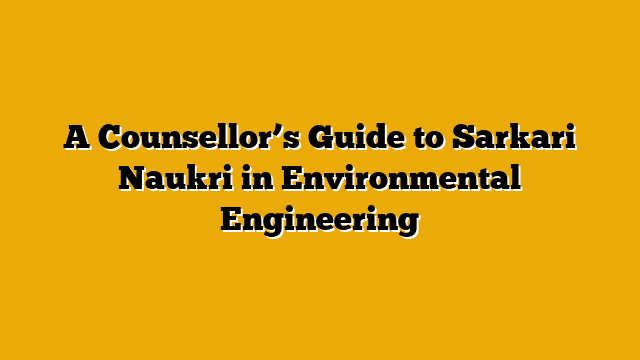
The pursuit of a “Sarkari Naukri,” a government job, holds a unique and revered position within Indian society. It’s often associated with stability, prestige, and a sense of contributing to the nation. For those with a passion for environmental sustainability and a background in engineering, the confluence of these aspirations—a Sarkari Naukri in the environmental engineering sector—presents a truly compelling path. As a professional counsellor, I often see individuals navigating career choices that balance personal fulfillment with practical realities. This article aims to illuminate the fulfilling and impactful journey that awaits within this specialized government domain.
Why Choose Environmental Engineering in the Government Sector?
The environmental challenges facing our world are immense, from climate change and pollution to resource depletion. Environmental engineers are at the forefront of developing solutions, and within the government framework, their impact is amplified.
Contributing to National Well-being
Government environmental engineers play a pivotal role in shaping and implementing policies that safeguard our natural resources, ensure public health, and promote sustainable development. This isn’t just a job; it’s a direct contribution to the well-being of millions and the health of our planet for future generations. Imagine being instrumental in designing a new wastewater treatment plant for a burgeoning city, or developing a policy to curb industrial emissions across an entire region. The scale of impact is truly significant.
Stability and Growth: The Pillars of Sarkari Naukri
Beyond the intrinsic rewards of purposeful work, a Sarkari Naukri offers unparalleled stability and a structured career progression.
Job Security and Benefits
In an increasingly dynamic job market, the security offered by government employment is a significant draw. This often includes comprehensive benefits, pensions, and a work-life balance that can be challenging to achieve in the private sector. This stability allows professionals to focus on their work with a sense of long-term security.
Opportunities for Professional Development
Government departments are typically committed to continuous learning and professional development. Environmental engineers in these roles often have access to specialized training, workshops, and opportunities to work on diverse projects, fostering a rich learning environment that enhances their expertise over time.
Navigating the Path: Securing a Sarkari Naukri in Environmental Engineering
The journey to a government environmental engineering position requires dedication and strategic preparation. Understanding the various avenues and requirements is crucial.
Key Recruiting Agencies and Examinations
Several government bodies are key employers of environmental engineers. Aspiring candidates need to be aware of their specific recruitment processes.
UPSC and State Public Service Commissions
The Union Public Service Commission (UPSC) and various State Public Service Commissions (PSCs) are primary recruiting bodies for gazetted officer positions. Their examinations are highly competitive and require thorough preparation in environmental engineering principles, general studies, and current affairs.
Forest and Environmental Services Examinations
Some states and the central government conduct specific examinations for roles within their forest and environmental departments, which often include positions for environmental engineers involved in conservation, pollution control, and resource management.
Public Sector Undertakings (PSUs)
Many Public Sector Undertakings (PSUs) involved in infrastructure, energy, and water management also recruit environmental engineers. These often have their own competitive examinations or recruit through GATE scores.
Specific PSUs to Consider
Examples include organizations like the National Thermal Power Corporation (NTPC) for environmental compliance in power generation, various State Pollution Control Boards, and urban development corporations involved in sanitation and waste management.
Essential Skills and Qualifications
Beyond academic qualifications, certain skills are highly valued in this sector.
Technical Proficiency
A strong foundation in environmental science, water and wastewater treatment, air pollution control, solid waste management, environmental impact assessment (EIA), and relevant environmental laws and regulations is paramount.
Analytical and Problem-Solving Abilities
Government roles often involve complex challenges that require meticulous data analysis, critical thinking, and innovative problem-solving. The ability to translate scientific principles into practical solutions is key.
Communication and Collaborative Skills
Environmental projects frequently involve inter-departmental coordination, public engagement, and report writing. Strong communication skills, both written and verbal, are essential for effective collaboration and policy dissemination.
A Rewarding Career Choice
A Sarkari Naukri in environmental engineering offers a unique blend of professional challenge, societal impact, and personal stability. It’s a career path for those who are driven by a desire to make a tangible difference, to contribute to the nation’s sustainable future, and to build a career on a foundation of purpose and security. If you are an environmental engineer contemplating your next steps, consider the profound and rewarding journey that awaits you within the government sector. It’s more than just a job; it’s a commitment to a healthier planet and a more sustainable future for all.
Disclaimer
We are not responsible for the accuracy of job postings on our website. Website users/visitor must verify information independently before taking action. We are not liable for any loss or damage resulting from the use of this information.